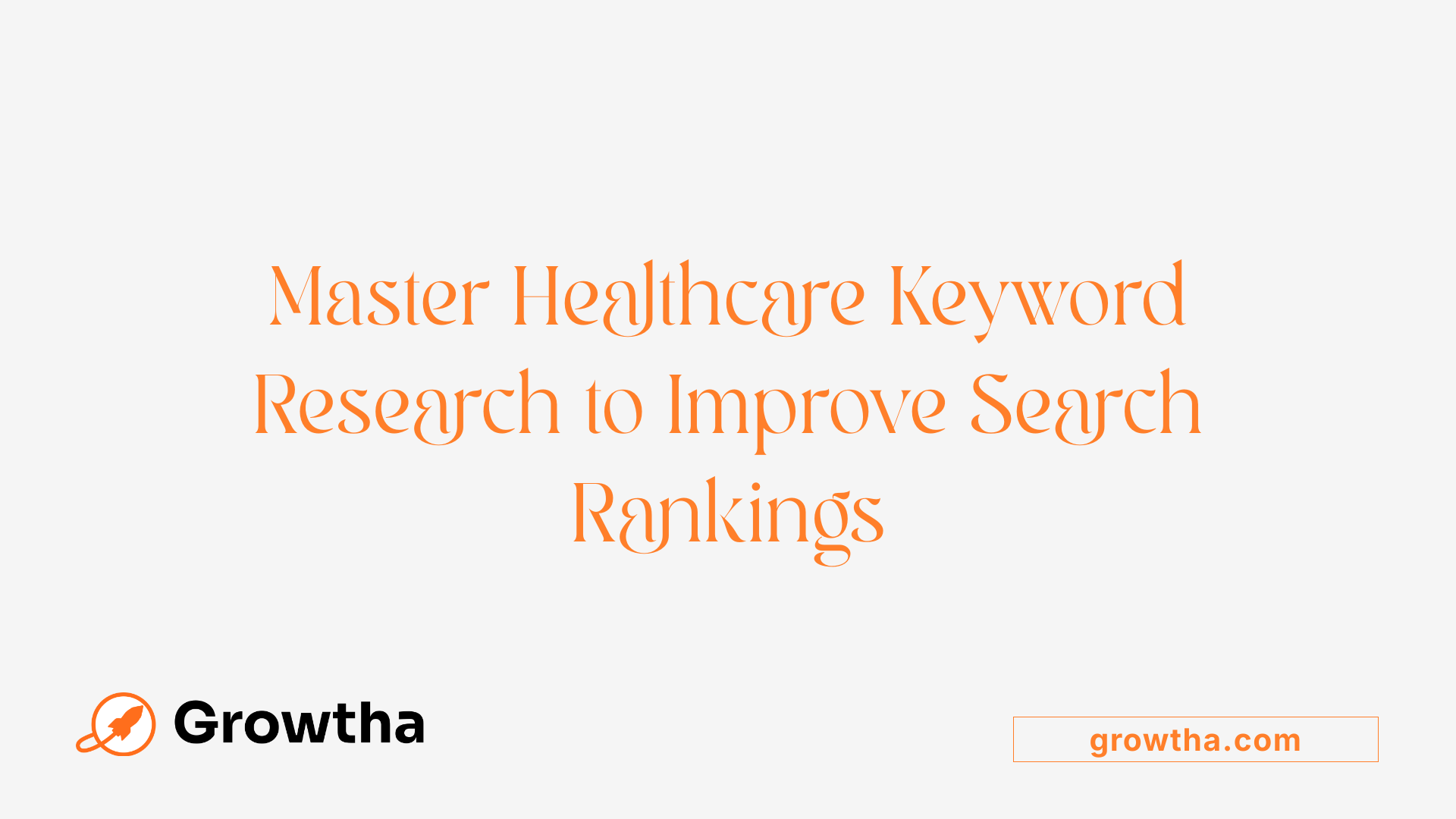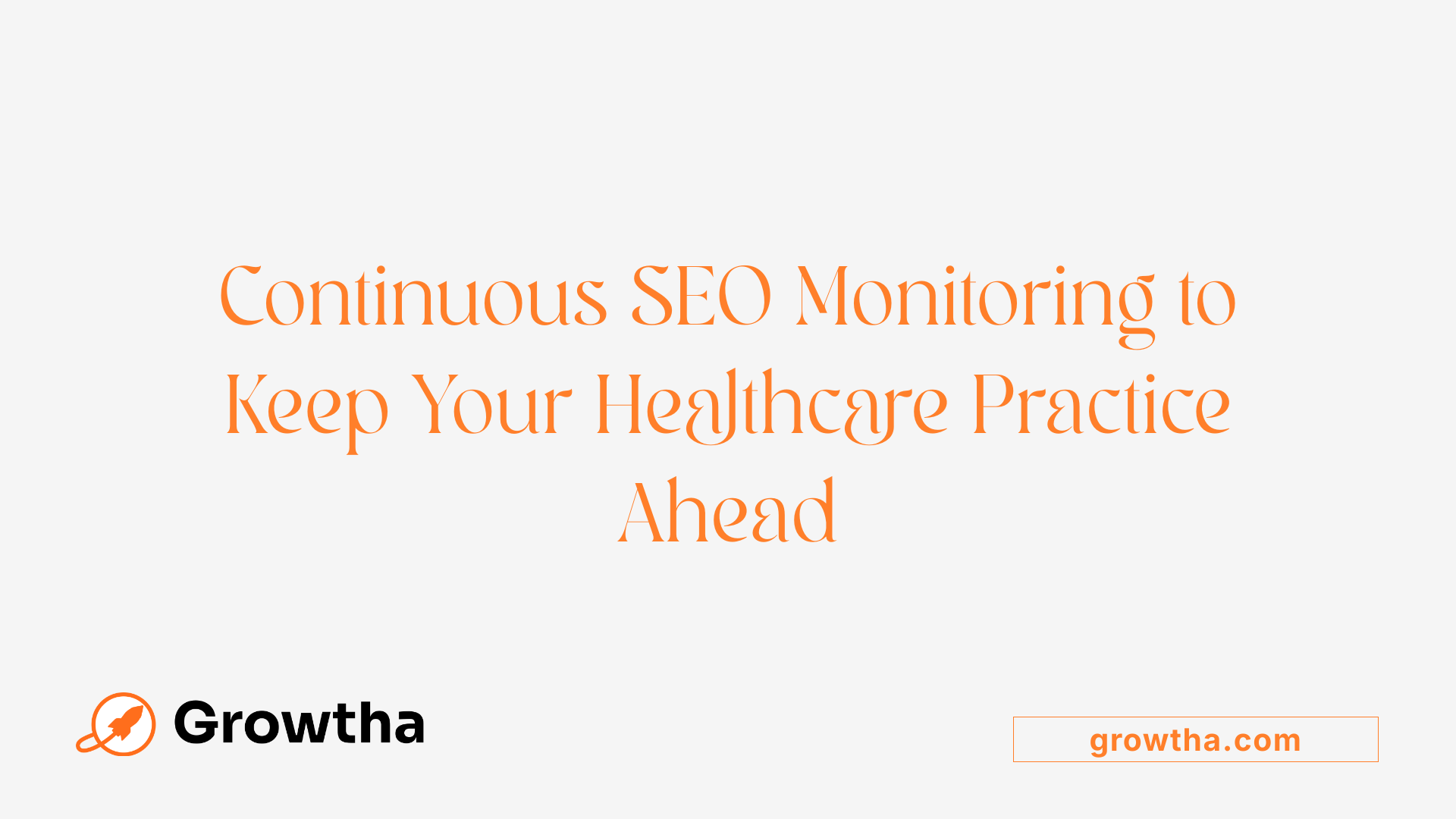How to Do Keyword Research for Healthcare Websites
Mastering Healthcare SEO: Unlocking the Power of Keyword Research


How to Do Keyword Research for Healthcare Websites
Understanding the Foundation of Healthcare Keyword Optimization
Effective keyword research is the cornerstone of successful healthcare SEO, enabling providers to connect with prospective patients precisely when they seek health-related information online. By strategically identifying and implementing the right keywords, healthcare organizations can improve their search visibility, attract qualified traffic, and ultimately grow their patient base. This comprehensive guide explores the best practices, tools, strategies, and nuances involved in conducting keyword research tailored specifically for healthcare websites.
Fundamentals of Healthcare Keyword Research
How can healthcare professionals and marketers effectively conduct keyword research to improve search visibility?
Conducting effective keyword research in healthcare involves understanding the language potential patients use when searching for medical information or services. Healthcare providers and marketers should focus on both specific, patient-centered keywords and broader terms to cover different search intents. Tools such as Google Keyword Planner, SEMrush, and Google Trends are essential in analyzing search volume, competition, and trending health topics.
By identifying relevant keywords, practitioners can create content that aligns with what patients are actively searching for. This includes integrating local SEO strategies, like location-specific keywords, to enhance visibility within community searches. Incorporating long-tail and niche phrases helps attract users with particular needs while lowering competition.
Balancing medical terminology with layman's language is crucial for accessibility. For example, pairing clinical terms like "hypertension treatment" with more common phrases such as "high blood pressure remedies" broadens the reach.
Mapping these keywords to specific website pages prevents content cannibalization and improves relevance. Continuous monitoring using Google Analytics enables practitioners to see which keywords drive traffic and to refine their approach accordingly.
Overall, a data-driven, holistic approach combining keyword research, local SEO, competitor analysis, and ongoing performance tracking will enhance search rankings and connect healthcare providers with the right audience.
Core Strategies in Healthcare Keyword Research
 Effective healthcare SEO begins with comprehensive keyword research, which helps your website appear in search results when potential patients look for medical services or health information.
Effective healthcare SEO begins with comprehensive keyword research, which helps your website appear in search results when potential patients look for medical services or health information.
Using specialized tools like Google Keyword Planner, SEMrush, and Google Trends allows you to discover relevant keywords with high search volumes, low competition, and strong relevance to your content. These tools help identify both broad terms like 'diabetes' and niche long-tail keywords like 'type 2 diabetes management tips,' which can attract targeted traffic.
Targeting both broad and long-tail keywords is essential. Broad keywords capture general searches, while long-tail keywords address specific patient needs and queries, often with less competition. This balanced approach improves your chances of ranking higher and reaching a wider audience.
Incorporating local SEO and geographic keywords is vital for healthcare providers serving specific communities. Using location-based terms such as the city or neighborhood ensures your practice shows up in local searches, increasing foot traffic and patient inquiries.
Analyzing competitors’ keyword strategies provides insight into what keywords are already driving traffic for similar practices. This helps you identify content gaps and opportunities to differentiate your website.
Seasonal and trending health topics also influence keyword effectiveness. Using tools like Google Trends, you can discover peaks in health-related search interest throughout the year—such as flu season or allergy periods—and create timely, relevant content.
By focusing on these elements—targeted keyword selection, local optimization, competitor analysis, and trending topics—you can develop an impactful keyword strategy that enhances your website’s visibility, builds authority, and attracts new patients.
Incorporating Local SEO and Geo-Targeting
 Optimizing healthcare websites for local SEO is vital for attracting nearby patients and improving visibility in community-specific searches. One of the most effective methods is using geographic keywords in website content, meta tags, and service pages. Incorporating location names—like city, neighborhood, or region—helps search engines associate your practice with a specific area, boosting your chances of appearing in local search results.
Optimizing healthcare websites for local SEO is vital for attracting nearby patients and improving visibility in community-specific searches. One of the most effective methods is using geographic keywords in website content, meta tags, and service pages. Incorporating location names—like city, neighborhood, or region—helps search engines associate your practice with a specific area, boosting your chances of appearing in local search results.
Creating dedicated location-specific pages further enhances local relevance. These pages should contain accurate contact information, embedded maps, and details about services offered within that community. This approach signals to search engines your target area and improves your site's local authority.
A crucial step is optimizing your Google My Business (GMB) profile. Ensuring your listing is complete, accurate, and regularly updated increases your chances of appearing in local map packs and knowledge panels. Collecting positive patient reviews and responding promptly build your practice's online reputation, drawing more local traffic.
Engagement with local backlinks—links from neighborhood directories, local news outlets, and industry partnerships—strengthens your website's local authority. Developing partnerships within your community encourages relevant backlinks, which are essential for higher search rankings.
Using geo analysis tools, such as Google Trends and local search data, helps identify community-specific search habits and keywords. These insights allow you to tailor your content to resonate with particular local health concerns or trending topics, making your website more relevant to your target audience.
| Strategy | Implementation Details | Benefits |
|---|---|---|
| Geographic Keywords | Integrate in titles, meta descriptions, and content | Improves local search rankings, attracts nearby users |
| Location-specific Pages | Create detailed pages for each service area | Enhances relevance and provides targeted information |
| Google My Business Optimization | Keep profiles complete, encourage reviews | Boosts local visibility and builds patient trust |
| Local Backlink Building | Partner with local organizations and directories | Increases authority and search engine trustworthiness |
| Community Search Habit Analysis | Utilize geo analytics tools | Tailors content to trending local health concerns |
Overall, a comprehensive local SEO strategy combines geo-targeted keywords, optimized community listings, and local backlinks, powered by geo analysis. These methods collectively improve how your healthcare practice appears in local search results, attracting qualified prospective patients from your community.
Technical SEO and Content Optimization
How does SEO work in the healthcare industry?
Healthcare SEO is a comprehensive approach that involves optimizing all aspects of a healthcare website to improve its visibility in search engine results. This includes refining technical elements, creating authoritative content, and employing strategic local SEO techniques. The process begins with detailed keyword research, focusing on patient-centric terms and medical terminology.
Technical site factors are crucial, such as ensuring fast page loading, mobile responsiveness, and secure HTTPS setup. These elements not only provide a better user experience but also align with search engine ranking criteria.
Implementing schema markup and rich snippets helps search engines understand healthcare content better, improving the chances of appearing in featured snippets and structured results. XML sitemaps and proper URL structures facilitate easier indexing of site pages, ensuring that all important content is discoverable.
Content quality remains central, emphasizing medical accuracy, readability, and authoritative authorship. Content should be created by qualified professionals and reviewed regularly to meet Google’s E-A-T and YMYL standards. Additionally, local SEO tactics like optimizing Google My Business profiles and embedding region-specific keywords boost visibility to nearby patients.
Off-site strategies, including building reputable backlinks and managing online reputation, further strengthen domain authority. Compliance with privacy laws such as HIPAA reassures patients about data security.
Monitoring tools like Google Analytics and Search Console help track performance, enabling continuous strategy refinement. Overall, these practices ensure healthcare providers can effectively reach and serve their community through improved search engine rankings.
Content Creation and Patient Engagement
 Creating authoritative, patient-focused content is essential for effective healthcare SEO. This approach ensures that your website not only ranks well but also provides genuine value to visitors, building trust and credibility.
Creating authoritative, patient-focused content is essential for effective healthcare SEO. This approach ensures that your website not only ranks well but also provides genuine value to visitors, building trust and credibility.
Utilize diverse content formats such as FAQs, blogs, testimonials, videos, and infographics. These materials help address common patient questions, showcase success stories, and explain medical topics clearly and engagingly. For example, patient testimonials can enhance trust, while educational videos and infographics can make complex health information more accessible.
Align your content with Google's E-E-A-T principles—Experience, Expertise, Authority, and Trustworthiness. Content authored by qualified medical professionals, supported by credible sources, and transparent about qualifications helps boost your site’s relevance and ranking.
Regularly update your website to reflect current health trends and new medical research. This not only improves SEO but also demonstrates your commitment to providing the latest, most accurate information. Incorporating trending health topics and seasonal content ensures your website remains relevant and engaging.
What are some examples of healthcare-related keywords and their search statistics?
Some of the most searched healthcare-related keywords include "wellbeing," which receives around 246,000 searches each month, and "mental wellness," with approximately 12,100 searches. The term "emotional health" is searched about 22,200 times monthly. Broader keywords like "health and wellness" reach roughly 40,500 searches per month.
Globally, "wellness" is extremely popular, with up to 673,000 searches. Other relevant keywords, covering areas such as physical wellness and mental health, generally have search volumes ranging from 8,100 to over 22,000.
Focusing on these keywords—especially those with high search volumes—can significantly enhance your content’s visibility. Strategic placement within your website, combined with local and long-tail keywords, optimizes your chances of attracting targeted patient traffic.
Continual Monitoring and Optimization
 To maintain and improve healthcare SEO efforts, continuous monitoring and refinement are essential. Utilizing analytics tools like Google Analytics and Google Search Console provides vital insights into how your website performs in search results.
To maintain and improve healthcare SEO efforts, continuous monitoring and refinement are essential. Utilizing analytics tools like Google Analytics and Google Search Console provides vital insights into how your website performs in search results.
Tracking metrics such as keyword rankings, traffic patterns, user behavior, and conversions helps identify what’s working well and where adjustments are needed. Regularly performing content audits and gap analyses allows you to pinpoint outdated information, duplicate content, or missing topics that could improve your authority and relevance.
Adjusting strategies based on this performance data ensures your SEO remains effective. For example, if certain keywords are underperforming, you might optimize existing content or develop new pages targeting those terms. Conversely, if specific content drives significant traffic and conversions, expanding on those topics can further boost results.
Consistent review of your SEO approach keeps your healthcare website visible to prospective patients. Combining detailed data analysis with ongoing strategy adjustments enables you to adapt to changing search behaviors and improve your overall search presence.
Emerging Trends and Future Directions

How does SEO work in the healthcare industry?
Healthcare SEO is a strategic process that enhances the online visibility of medical practices and healthcare providers. It involves optimizing website content, improving technical site factors, and organizing site structure to rank higher in organic search results for health-related questions and services. Core activities include thorough keyword research, producing reliable and expert-backed content aligned with Google's E-A-T principles—Expertise, Authority, and Trustworthiness—and complying with privacy standards like HIPAA.
Technical elements such as fast-loading pages, mobile responsiveness, schema markup, and XML sitemaps are essential. Local SEO efforts, like optimizing Google My Business profiles and creating location-specific pages, attract nearby patients. Off-site tactics, such as earning reputable backlinks and managing online reviews, build domain authority and credibility.
A user-friendly website design, accessibility for all users, and compliance with health privacy laws foster trust and engagement. Continuous performance monitoring through analytics tools enables ongoing strategy refinement, helping healthcare practices stay competitive in the evolving digital space.
Are there free tools available for healthcare keyword research?
Yes, healthcare providers and marketers can access several free tools to support keyword research. Google Keyword Planner and Google Trends are popular options that offer data on search volumes, trends, and relevance. Moreover, WordStream provides a free keyword research tool that generates suggested keywords, estimated competition, CPC, and search data.
WordStream’s tool is beneficial for healthcare marketing as it sources data directly from Google and Bing, ensuring reliable and current insights. Its filtering options allow targeting specific locations or industries, making it suitable for both local and broader campaigns.
Using these free resources enables healthcare organizations to identify high-value keywords, monitor search trends, and create effective content strategies without additional costs, ultimately helping attract more relevant patient traffic.
Future trends in healthcare SEO
The future of healthcare SEO is set to be shaped by advancements in voice search, AI-powered content creation, and a continued emphasis on privacy and regulation compliance. Voice search optimization, especially important in tier 2 and tier 3 cities, calls for content that uses natural, conversational language and long-tail queries.
Artificial intelligence (AI) tools are increasingly used to analyze keywords and generate content ideas, making SEO efforts more efficient and targeted. Tools like AI-driven content generators and advanced analytics help refine strategies based on real-time data.
Privacy regulations such as HIPAA influence how health information is shared and presented online. Ensuring content is compliant while being optimized for search is critical.
Additionally, search engine algorithms are frequently updated, requiring healthcare providers to stay informed about changes. Adapting to new standards, such as core web vitals and schema updates, will be essential for maintaining strong search rankings.
| Trend | Impact | Future Outlook |
|---|---|---|
| Voice Search Optimization | Increased use of natural language queries in health topics | Content tailored for conversation-style search queries |
| AI Integration | Automated keyword analysis and content creation | Smarter, more targeted SEO strategies |
| Privacy & Regulations | Strict compliance with HIPAA and data protection laws | Balanced content with trustworthiness and user security |
| Algorithm Updates | Regular changes requiring ongoing SEO adaptation | Continuous learning and agile SEO strategy development |
Remaining aware of these evolving trends allows healthcare providers to adopt innovative strategies, improve patient engagement, and maintain a competitive edge in search engine rankings.
Summing Up: Elevating Healthcare Search Strategies
Effective keyword research is an indispensable element of healthcare SEO, enabling providers to target the right audience, enhance online visibility, and deliver valuable, authoritative content. By leveraging modern tools, adhering to best practices, and continuously monitoring performance, healthcare professionals and marketers can stay ahead of evolving search trends. Embracing local SEO, technical optimization, and patient-focused content not only boosts search rankings but also builds trust and engagement, translating online visibility into real-world health outcomes. As the digital landscape evolves with AI, voice search, and privacy considerations, ongoing adaptation and strategic refinement remain crucial for success. Investing in thorough keyword research today lays the foundation for a resilient, effective healthcare online presence tomorrow.
References
- Best SEO Keyword Strategy for Healthcare - WebMD Ignite
- Unlocking Healthcare Keyword Success: 7 Steps Guide
- Healthcare SEO: How to get found online | Kontent.ai
- How to Conduct Keyword Research for Local Medical SEO
- Healthcare SEO: Complete Industry Guide for 2025
- Keyword Research Services for Healthcare - Aha Media Group
- Healthcare SEO: The Ultimate Guide to Medical SEO in 2025







